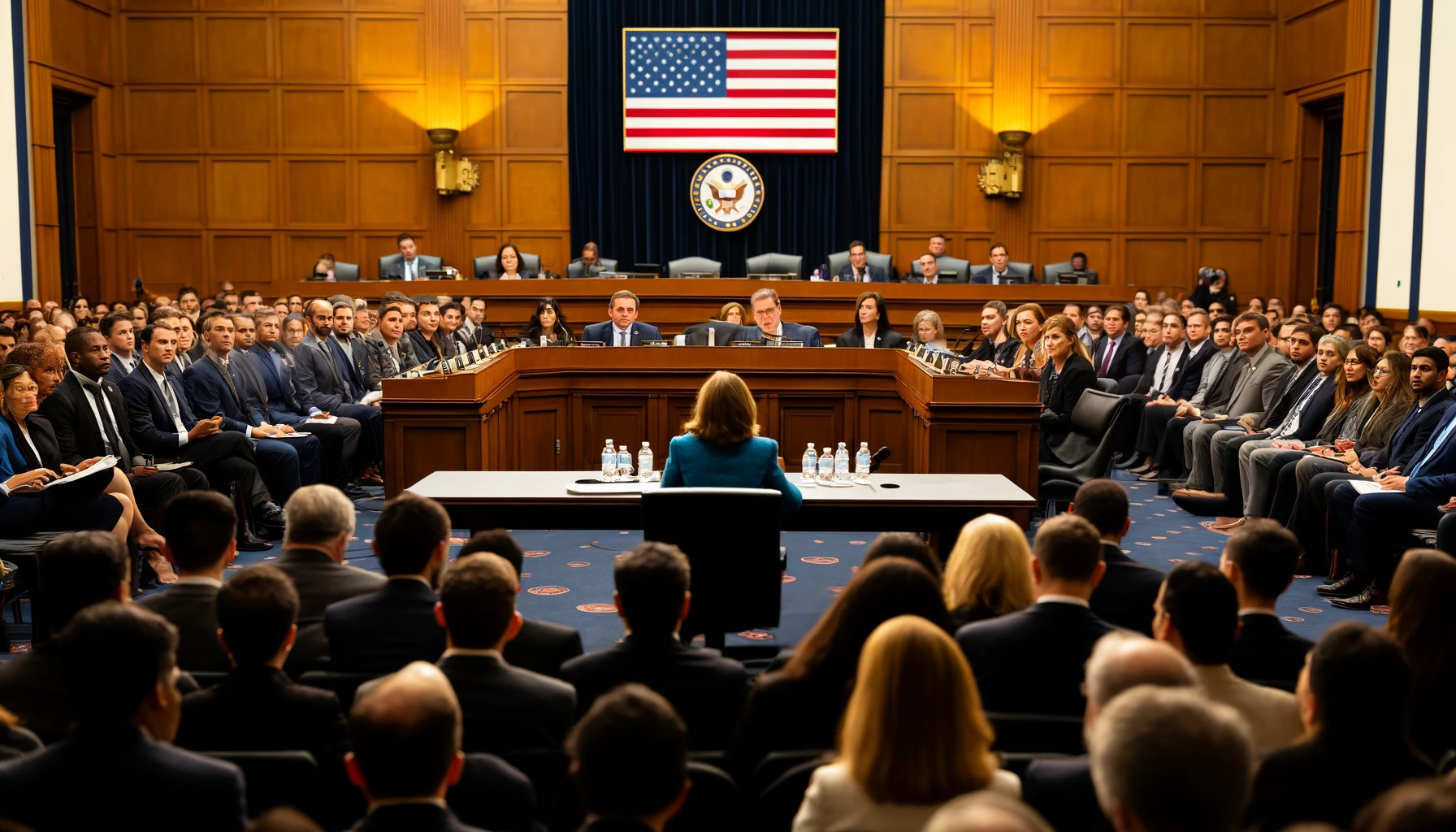On Wednesday, there was a feeling of rdéjà vu on Capitol Hill as the president of Columbia University testified about the university’s response to antisemitic incidents following the Oct. 7 attack by Hamas on Israel and the subsequent military response by Israel in Gaza. This issue has been more prominent since the Anti-Defamation League reported a significant rise in antisemitic incidents on college campuses after Oct. 7.
The hearing resembled a previous one in December, where members of the House Education Committee intensely questioned the presidents of Harvard University, the Massachusetts Institute of Technology, and the University of Pennsylvania. The outcomes of that hearing were significant, with two presidents resigning partly due to the proceedings.
However, there were notable differences in the latest hearing. Unlike the previous one, representatives from Columbia University concurred with lawmakers that antisemitism was a severe issue on their campus, emphasizing zero tolerance for such behavior. Columbia University’s President, Nemat Shafik, stated, “It is not tolerated and it is not acceptable,” highlighting the university’s commitment to improving policies and enforcement over the past six months.
During the hearing, when asked by Suzanne Bonamici, a Democrat from Oregon, if calling for the genocide of Jews was against Columbia’s code of conduct, all representatives from Columbia unequivocally affirmed that it was. This response marked a stark contrast to the December hearing, where answers from other universities lacked clarity, drawing criticism.
Acknowledging the challenges, Columbia trustee Claire Shipman admitted to “a moral crisis” on the campus. The hearing also saw lawmakers like Tim Walberg and Elise Stefanik probe into specific incidents involving Columbia professors who expressed support for Hamas, questioning whether disciplinary actions were taken against them. The university’s leaders assured that they would hold faculty members accountable for antisemitic speech.

Columbia has established a Task Force on Antisemitism, disciplined several students, and suspended those involved in unauthorized events. President Shafik reiterated the importance of education in combating antisemitism, promising to include relevant lessons in orientations for new students.
Jacob Schmeltz, a senior at Columbia and a co-vice president of the Jewish On Campus Student Union, expressed satisfaction with the university’s clear acknowledgment of the issues faced by Jewish students. He emphasized the need for the university to follow through on its commitments to make a significant impact on campus climate.
The fallout from the December hearing included high-profile resignations from university presidents under tough questioning, most notably from Penn President Elizabeth Magill and Harvard’s president, Claudine Gay.
In anticipation of the hearing, President Shafik prepared a letter to the campus community, underscoring the seriousness of combating antisemitism at Columbia. The Republican chair of the committee, Rep. Virginia Foxx, expressed that the hearing was prompted by severe cases of antisemitism at Columbia, emphasizing the need for the university to show tangible progress.
Columbia University is not only under scrutiny from the House Education Committee but also faces investigation by the U.S. Education Department for potential civil rights violations following the events of Oct 7. The hearing concluded with the possibility of further discussions if Columbia does not demonstrate sufficient progress.
Ahead of the hearing, Jewish faculty members from Columbia and Barnard College voiced concerns over the potential misuse of antisemitism accusations on college campuses, advocating for an educational environment that supports open and rigorous debate among all students, regardless of their backgrounds.
This article is based on the following article:

Background Information
This background should provide readers with a clearer understanding of the issues discussed in the article, placing the specific events within a broader societal and historical context.
1. Understanding Antisemitism
Antisemitism refers to hostility, prejudice, or discrimination against Jews. It can manifest in various forms, from verbal abuse and propaganda to violence and policies that discriminate against Jewish people. Historically, antisemitism has led to severe consequences, including the Holocaust during World War II, where six million Jews were murdered by the Nazi regime. Recognizing antisemitism is crucial for understanding why such incidents are taken seriously and lead to significant institutional and political responses.
2. Role of College Campuses
College campuses are vital centers for learning, discussion, and activism. They are often seen as microcosms of larger societal issues because they are places where young adults from diverse backgrounds meet and exchange ideas. Universities strive to create environments that foster intellectual growth and are free from discrimination and harassment. When incidents of bias or hate, like antisemitism, occur on campuses, they can disrupt this environment and lead to broader societal concerns about tolerance and rights.
3. The Oct. 7 Hamas Attack and Its Aftermath
On October 7, there was a significant escalation in the long-standing conflict between Israel and Hamas (a Palestinian Islamist political organization and militant group that has governed the Gaza Strip since 2007). The attack led to a sharp response from Israel and heightened tensions globally, affecting international relations and local communities, including universities where there are diverse opinions about Middle Eastern politics. These events often result in increased polarization and can lead to incidents of hate speech and violence.
4. Congressional Hearings and Their Purpose
Congressional hearings are official proceedings held by the United States Congress to investigate, review, and discuss matters of public concern, legislation, or oversight of public and private activities. These hearings allow lawmakers to gather information, question witnesses, and shape public policy. The hearings mentioned in the article were specifically focused on how universities respond to claims and incidents of antisemitism, which reflects Congress’s role in addressing civil rights and ensuring educational institutions uphold laws against discrimination.
5. The Specific Universities and Actions Mentioned
- Columbia University faced scrutiny for how it handled recent antisemitic incidents. The response from university officials in hearings can influence public and academic policies, student safety, and the institution’s reputation.
- Harvard University, MIT, and the University of Pennsylvania were also mentioned in relation to how they handle similar issues, highlighting that this is a widespread concern across major educational institutions.
6. Legal and Moral Responses to Hate Speech on Campuses
The debate over what constitutes hate speech versus free speech is complex, particularly in academic settings that encourage free thought and debate. How universities handle accusations of hate speech, implement disciplinary actions, and educate their communities about these issues are crucial aspects of maintaining campus environments that are both open to free expression and safe for all students.

Debate/Essay Questions
- Is it appropriate for Congress to intervene in how universities handle antisemitism and other forms of hate speech on campus?
- Can educational institutions effectively combat antisemitism through mandatory orientations and educational programs about hate speech?
- Is the media’s coverage of antisemitism on college campuses balanced, or does it contribute to the polarization of this issue?
- Does the response to antisemitism on campuses need to be different from responses to other forms of discrimination? Why or why not?
Please subscribe to Insight Fortnight, our biweekly newsletter!
